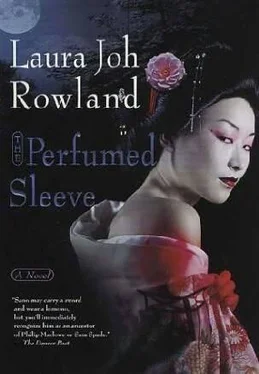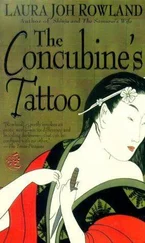Sano memorized the information for later use. “What do you have on Tamura?”
Toda scanned several pages, then summarized, “Tamura Banzan, age forty-seven. Hereditary vassal to Makino. He’s renowned as a sword fighter, but his combat experience has been confined to the training grounds.” Toda met Sano’s eyes and added, “A samurai with his taste for the martial arts has usually blooded his sword at least once by his age. But there’s no record that Tamura has ever killed.”
“A record free of killings doesn’t exonerate him,” Sano said, “nor does it prove he’s incapable of murder.” A bureaucrat like Tamura had few occasions to fight to the death. “What can you tell me about Tamura’s relations with Senior Elder Makino?”
“Sources within Makino’s retinue have reported frequent altercations between him and Tamura.”
“Altercations about what?”
“Makino had a habit of demanding money from lesser bakufu officials,” Toda said. “Since he had the power to ruin them if they didn’t pay, they seldom resisted him. Tamura disapproved of this habit. He also disapproved of Makino’s profligate relations with women. Tamura told Makino that his extreme greed for money and sex was a transgression against Bushido.”
The warrior code of honor decreed that money was dirty and beneath the notice of a samurai, who should rise above material concerns. He should also abstain from overindulging in the pleasures of the flesh, which distracted him from duty. Sano observed that the conflict between Tamura and Makino had run far deeper than Tamura had suggested.
“How did Makino react when Tamura accused him of dishonor?” Sano asked.
“Makino was understandably insulted,” Toda answered. “He said his personal affairs were none of Tamura’s business, he would do as he pleased, and if Tamura didn’t keep his mouth shut, he would lose his post.”
To be dismissed from the servitude that gave him a livelihood, a respectable place in society, and meaning to his existence was a catastrophe for a samurai.
“Tamura should have humbly accepted Makino’s judgment and never raised the subject again,” Toda said. This was the custom when a samurai exercised his duty to criticize his master and the master spurned the criticism. “But Tamura considered Makino’s faults a personal insult to himself. He kept after Makino to change his habits. His objections, and Makino’s threats, grew louder and more violent over the years. They came to despise each other. But Tamura was a competent, valuable chief retainer. Makino needed him.”
“Makino died before their problems could result in Tamura’s dismissal,” Sano said thoughtfully. “And now that Makino is gone, one of his sons will take his place as head of the clan.”
Toda nodded, giving credence to this suggestion that Tamura had killed Makino to keep his post and gain a new master more worthy of him.
“But Tamura prizes his own honor,” Ibe broke in, obviously displeased to see suspicion gathering around the chief retainer instead of Lord Matsudaira. “He wouldn’t have committed the ultimate sin of murdering his master.”
“Allow me to remind you that there’s one instance when murdering one’s master is justified,” Toda said.
“That’s when the master is such an incorrigible disgrace that only his death can redeem his honor,” Sano said. “If Tamura believed this to be the case, he’d have considered it his duty to kill Makino.”
“But Tamura wouldn’t have killed a favored friend of the shogun,” Ibe protested. “He wouldn’t have wanted to offend our lord-or risk the punishment.”
“Whoever killed Makino tried to cover up the murder,” Sano said. “Maybe Tamura did it in order to escape the consequences.”
“Here’s some news that might interest you,” Toda said. “Late yesterday, Tamura swore out a vendetta.”
Vendetta was the means by which a citizen could exact personal revenge for a serious offense, usually the murder of a relative. The law required the avenger to follow a strict procedure. He must first present to the authorities a letter of complaint that described the offense and named his enemy. The authorities would grant him permission to slay his foe. The avenger would locate his enemy, declare his aim to kill him, and specify the reason. The two would then fight a duel to the death. If the avenger won, he presented the head of his foe to the officials who had authorized the vendetta. The advantage of this system was that as long as the avenger followed the rules, he could murder his foe and walk away a free man. The disadvantage was that the procedure allowed his target to hear about the vendetta and run, hide, or otherwise protect himself.
“Against whom did Tamura swear this vendetta?” Sano said, puzzled.
“The murderer of Senior Elder Makino,” said Toda. “Tamura wrote in his complaint that he can’t specify the name of his target because he doesn’t yet know who killed his master.”
“But his vendetta was sanctioned anyway?” Sano had thought that any deviation from the rules would cause the authorities to reject a vendetta.
“The magistrate apparently decided that the circumstances justified bending the rules,” Toda said.
A samurai owed his master an even greater loyalty after death than in life. Should his master die by foul play, a samurai had the right and solemn duty to avenge him. This explained why the magistrate had made an exception for Tamura. Now Sano perceived the implications that Tamura’s vendetta had for his investigation.
“Well, now there’s all the more reason to believe that Tamura isn’t the killer,” Ibe said, voicing Sano’s thoughts. “He wouldn’t swear out a vendetta on himself.”
“He might, to make himself appear innocent,” Sano said.
“That’s mere, unfounded supposition,” Ibe scoffed. “You know as well as I that the killer is most likely someone outside Makino’s circle.”
He cut a hostile glance at Lord Matsudaira’s men. They’d been listening in attentive quiet, but now one of them rose to Ibe’s bait: “I agree that we’re seeking the killer in the wrong place.” A young samurai with a hungry look of ambition, he said to Toda, “What information do you have about Chamberlain Yanagisawa that might indicate he’s behind the murder?”
Caution hooded the metsuke agent’s eyes. “I’ve nothing to say on the subject of the chamberlain.”
“How prudent you are,” Ibe said. His smirk expressed condescension toward Toda and triumph over the man who’d asked about Yanagisawa. “Remember that the chamberlain controls the metsuke,” he told the Matsudaira contingent. “Don’t expect it to serve your master.” He said to Toda, “What I want to know is, can you connect Lord Matsudaira to the murder?”
“I’ve nothing to say about him, either,” Toda said.
“Remember that your master’s position is subject to change,” the young samurai told Ibe. His gaze challenged Toda. “When the dust settles, you may find that the metsuke has lost the chamberlain’s protection and you need new friends. So you’d better answer my question.”
Toda’s face was perfectly still and calm; yet Sano sensed him trying to navigate a safe path between the two factions. At last he spoke: “Chamberlain Yanagisawa had a spy in Senior Elder Makino’s retinue.” Ibe exclaimed in angry protest, while the Matsudaira man grinned, triumphant. Toda continued smoothly, “So did Lord Matsudaira.” The Matsudaira man frowned; Ibe’s protests subsided. “Yanagisawa’s spy is a guard named Eiichi,” Toda said to Sano. “Lord Matsudaira’s is a guard named Sayama. You may want to ask them what they were doing the night Senior Elder Makino died.”
Ibe and the Matsudaira man looked nonplussed; neither spoke. Each was obviously glad to have the opposition incriminated yet at the same time fearful that Toda would further compromise his master. Although perturbed that Toda had handed him new evidence connected to the warring factions, Sano felt a reluctant admiration for Toda’s finesse at placating both sides but favoring neither.
Читать дальше












